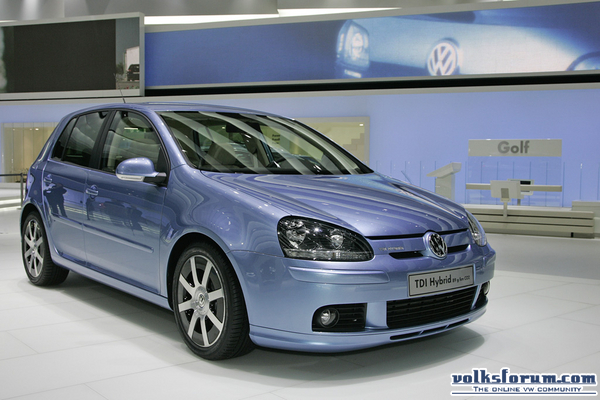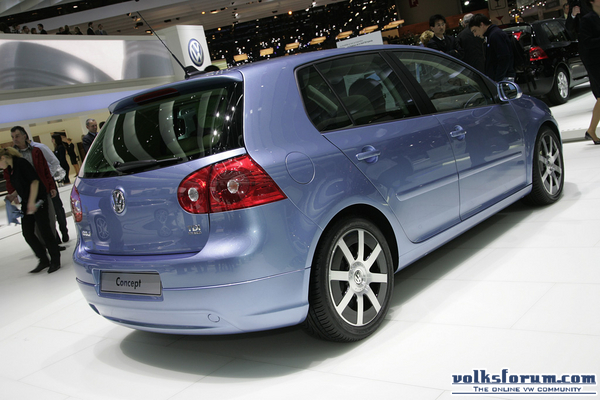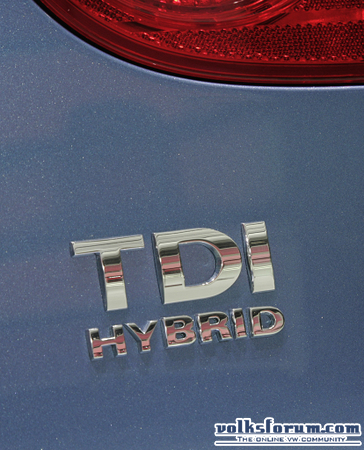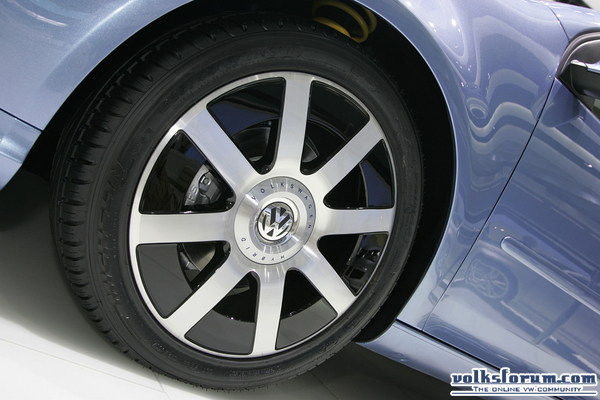
 |
2008 Geneva Motor Show - Golf TDI Hybrid Concept
 Geneva Motor Show 2008: Golf TDI Hybrid - world premiere High-tech alliance of diesel and E-motor: Golf TDI Hybrid consumes just 3.4 liters fuel per 100 kilometers Golf TDI Hybrid concept relies on fuel economy of the diesel engine High-tech alliance of 75-PS TDI, 27-PS E-motor and 7-speed DSG Wolfsburg, 04 March 2008 In the Golf TDI Hybrid Volkswagen is demonstrating the great energy-saving potential that is possible when high-tech diesel, E-motor and 7-speed DSG are combined. The concept car that is being shown for the first time in the world at the Geneva Motor Show consumes just 3.4 liters diesel per 100 kilometers. A record value. Designed as a high-performance full hybrid, the Golf TDI Hybrid masters both pure combustion and mixed mode operation - that is, the powerful and fuel-efficient combination of TDI and E-motor. Also possible: emissions-free driving in electric drive mode, with TDI switched off. Power transfer to the front axle is managed by a 7-speed DSG (dual clutch transmission). In the city, an automatic start/stop feature also automatically shuts down the turbo-diesel whenever the vehicle is at a stop. On the Golf TDI Hybrid - painted in the new car color Vivid Blue - both the exterior and interior were modified compared to the production car. Especially distinctive on the exterior: the independently designed radiator grille with special high-end appeal. In the pursuit of better aerodynamics designers also minimized the area of the air inlets here. Fuel-efficient alliance of TDI, E-motor and DSG As the primary source of propulsion, Volkswagen is relying on an extremely fuel-efficient three-cylinder diesel with 1.2 liter displacement, common rail injection and variable turbocharger geometry. The TDI outputs 55 kW / 75 PS (at 4,000 rpm) and a maximum torque of 180 Newton-meter (starting at 2,200 rpm). The electric motor was flanged onto the so-called output side of the TDI. This synchronous motor delivers an emissions-free 20 kW / 27 PS rated power and 140 Newton-meter torque. In addition, the E-motor also functions as a starting clutch and generator; that is, it replaces the starter and alternator. The system’s nickel metal hydride battery (NiMH) is placed in the trunk and weighs 45 kilograms. NiMH battery storage is distinguished by high energy density and long life. In the Golf TDI Hybrid, the NiMH battery supplies the E-machine with 202 Volt of voltage and total energy of 1.3 kilowatt-hours. Handling power transfer to the front axle is the7-speed DSG. The world’s most advanced automatic operates faster and more efficiently than any other production transmission, and it also contributes to the extraordinarily high energy savings potential of the Golf TDI Hybrid. Intelligent energy management No hybrid can operate without a well thought-out energy management concept. No less has been achieved in the Golf TDI Hybrid concept car: it is only through the intelligent interplay of TDI, E-motor, DSG and battery that the full hybrid attains its tremendous fuel economy, which we surmise might even be a record. For example, depending on the gas pedal position and the selected gear the control system may “engage” the electric motor to boost the diesel or to provide the propulsion by itself. In parallel, during coast-down and braking a portion of the car’s kinetic energy of motion is fed back to the battery through the E-machine, which now functions as a generator (recuperation). In these cases, the combustion engine is deactivated; it restarts automatically when there is an increased demand for power. In city driving too, at the red light or in a traffic jam, the diesel does not operate (start/stop operation). Driver and passengers can observe data such as driving ranges, fuel economy values and the momentary energy flow via the touchscreen of the radio-navigation system. Development goal: less than 90 grams CO2 emissions The challenging development goal of Volkswagen Hybrid Development was to attain CO2 emissions of under 90 g/km. This was achieved: At just 89 grams, the Golf TDI Hybrid is an extraordinarily environmentally-friendly and economical vehicle. And not just on paper. Drivers of gasoline-powered hybrid vehicles often note to their dismay that on long expressway trips actual gasoline fuel economy deviates significantly from the manufacturer’s data. Not so on the Golf TDI Hybrid. After all, the torque-strong TDIs from Wolfsburg have also proven to be highly efficient on the expressway. TDI and E-motor combine to form a source of propulsion, which is as clean as it is economical and already satisfies the future Euro-5 emissions standard today. The Golf TDI Hybrid shown in Geneva is still a concept. But it certainly will not just remain a concept. Exterior and interior design: sustainability as inspiration The Golf TDI Hybrid is a vehicle in which sustainability - the protection of resources - assumes center stage in the overall concept. The theme of sustainability also has made an impact on the exterior and interior styling of the Golf Hybrid. That is because it nearly goes without saying that innovative technical solutions call for an innovative design language. The exterior design of the Golf has intrinsic value: status-neutral and nearly timeless, this form embodies the aspect of sustainability like very few cars in automotive history. On the Golf TDI Hybrid much love for detail was applied to aerodynamic optimizations and simultaneously to modest but noticeable new accents that were realized. Exterior modifications in detail: Individually designed radiator grille with especially high-end appeal. Surface area of air inlets has been minimized. “TDI-Hybrid” signature embedded in the grille. Add-on parts to the front and rear ends in the style of the Golf GTI Edition 30. Wheels in an independent design. Low-profile chassis with reduced ground clearance. New intense blue metallic paint that goes by the name Vivid Blue. In the passenger compartment, the interior color “Arctic”, together with blue accents, creates a bright and friendly ambiance. The materials used here are extraordinary. They develop their own unique quality and radiance or - to use the professional jargon of the designers - an “ecological aesthetic”. Lead Volkswagen designer Friederike Plock-Girmann had this to say: “Never before have materials been so innovative, dramatic or simply astonishing. Intelligent textiles assume a purpose other than just being decorative. The future belongs to these sustainable materials. They allow us designers the opportunity to give shape an innovative ecological aesthetic.” The interior modifications in detail: The central area of the seats is a “river grass” design - a material that is produced from recycled polyester. The side supports on the seats consist of so-called “E-leather”, a new type of “leather fabric” that is recovered from scraps in leather processing operations. The blue panels of the seats consist of split leather, which is generated as a waste product in leather processing. A visual and technical highlight: the decorative trim strips. They are made of quickly growing and renewable bamboo.    |
hate the grill, but it fits with the looks of the Polo bluemo. and what's up with the rims?
|
i like the rims :)
maybe better aerodynamics? |
color is nice too... 10milionen edition revisited?
|
It's about time that the pesky Toyota got some serious competition (not to mention good looking competition!). I have no doubt that this version will become very popular!
|
| All times are GMT +1. The time now is 23:37. |
Powered by vBulletin
Copyright ©2000 - 2025, Jelsoft Enterprises Ltd.